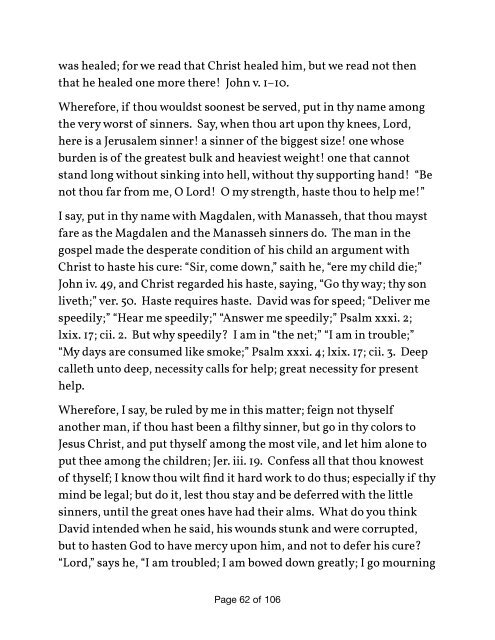The Jerusalem Sinner Saved; or Good News for the Vilest of Men by John Bunyan 1689
An encouraging book for those who feel guilty about their sins. It is a wonderful reminder that Christ's grace to his people knows no bounds and that his power to save even the worst sinner is not limited. "I have been vile myself, but I have obtained mercy; and I would have my companions in sin partake of mercy too: and therefore, I have writ this little book." Thus wrote John Bunyan about this unique gem. The premise of this book is that Jesus wanted his disciples to proclaim the gospel to the worst of sinners - those in Jerusalem who crucified their Messiah. To Bunyan's mind, this was the worst possible sin. The apostles were to begin there, with these worst of sinners, because, in Christ's eyes, they had the greatest need. Also, when they believed in Christ, his name would receive the greatest fame, and thus others would be encouraged to come to Christ. The kingdom of Satan would then be weakened, and the tempted and the weak would be helped. Further, the greatest sinners would love Christ the most when saved, and those who refused to repent would be left with no excuse. To Bunyan's way of thinking, this command to preach the gospel to "Jerusalem sinners" shows the gracious intentions of Christ toward men and his sufficiency to save the worst of sinners, and gives encouragement to those who think that their sin is too great to be forgiven.
An encouraging book for those who feel guilty about their sins. It is a wonderful reminder that Christ's grace to his people knows no bounds and that his power to save even the worst sinner is not limited.
"I have been vile myself, but I have obtained mercy; and I would have my companions in sin partake of mercy too: and therefore, I have writ this little book." Thus wrote John Bunyan about this unique gem.
The premise of this book is that Jesus wanted his disciples to proclaim the gospel to the worst of sinners - those in Jerusalem who crucified their Messiah. To Bunyan's mind, this was the worst possible sin. The apostles were to begin there, with these worst of sinners, because, in Christ's eyes, they had the greatest need. Also, when they believed in Christ, his name would receive the greatest fame, and thus others would be encouraged to come to Christ. The kingdom of Satan would then be weakened, and the tempted and the weak would be helped. Further, the greatest sinners would love Christ the most when saved, and those who refused to repent would be left with no excuse. To Bunyan's way of thinking, this command to preach the gospel to "Jerusalem sinners" shows the gracious intentions of Christ toward men and his sufficiency to save the worst of sinners, and gives encouragement to those who think that their sin is too great to be forgiven.
Create successful ePaper yourself
Turn your PDF publications into a flip-book with our unique Google optimized e-Paper software.
was healed; f<strong>or</strong> we read that Christ healed him, but we read not <strong>the</strong>n<br />
that he healed one m<strong>or</strong>e <strong>the</strong>re! <strong>John</strong> v. 1–10.<br />
Wheref<strong>or</strong>e, if thou wouldst soonest be served, put in thy name among<br />
<strong>the</strong> very w<strong>or</strong>st <strong>of</strong> sinners. Say, when thou art upon thy knees, L<strong>or</strong>d,<br />
here is a <strong>Jerusalem</strong> sinner! a sinner <strong>of</strong> <strong>the</strong> biggest size! one whose<br />
burden is <strong>of</strong> <strong>the</strong> greatest bulk and heaviest weight! one that cannot<br />
stand long without sinking into hell, without thy supp<strong>or</strong>ting hand! “Be<br />
not thou far from me, O L<strong>or</strong>d! O my strength, haste thou to help me!”<br />
I say, put in thy name with Magdalen, with Manasseh, that thou mayst<br />
fare as <strong>the</strong> Magdalen and <strong>the</strong> Manasseh sinners do. <strong>The</strong> man in <strong>the</strong><br />
gospel made <strong>the</strong> desperate condition <strong>of</strong> his child an argument with<br />
Christ to haste his cure: “Sir, come down,” saith he, “ere my child die;”<br />
<strong>John</strong> iv. 49, and Christ regarded his haste, saying, “Go thy way; thy son<br />
liveth;” ver. 50. Haste requires haste. David was f<strong>or</strong> speed; “Deliver me<br />
speedily;” “Hear me speedily;” “Answer me speedily;” Psalm xxxi. 2;<br />
lxix. 17; cii. 2. But why speedily? I am in “<strong>the</strong> net;” “I am in trouble;”<br />
“My days are consumed like smoke;” Psalm xxxi. 4; lxix. 17; cii. 3. Deep<br />
calleth unto deep, necessity calls f<strong>or</strong> help; great necessity f<strong>or</strong> present<br />
help.<br />
Wheref<strong>or</strong>e, I say, be ruled <strong>by</strong> me in this matter; feign not thyself<br />
ano<strong>the</strong>r man, if thou hast been a filthy sinner, but go in thy col<strong>or</strong>s to<br />
Jesus Christ, and put thyself among <strong>the</strong> most vile, and let him alone to<br />
put <strong>the</strong>e among <strong>the</strong> children; Jer. iii. 19. Confess all that thou knowest<br />
<strong>of</strong> thyself; I know thou wilt find it hard w<strong>or</strong>k to do thus; especially if thy<br />
mind be legal; but do it, lest thou stay and be deferred with <strong>the</strong> little<br />
sinners, until <strong>the</strong> great ones have had <strong>the</strong>ir alms. What do you think<br />
David intended when he said, his wounds stunk and were c<strong>or</strong>rupted,<br />
but to hasten God to have mercy upon him, and not to defer his cure?<br />
“L<strong>or</strong>d,” says he, “I am troubled; I am bowed down greatly; I go mourning<br />
Page<br />
62 <strong>of</strong> 106

















